
-
 Afrikaans
Afrikaans -
 Albanian
Albanian -
 Amharic
Amharic -
 Arabic
Arabic -
 Armenian
Armenian -
 Azerbaijani
Azerbaijani -
 Basque
Basque -
 Belarusian
Belarusian -
 Bengali
Bengali -
 Bosnian
Bosnian -
 Bulgarian
Bulgarian -
 Catalan
Catalan -
 Cebuano
Cebuano -
 Corsican
Corsican -
 Croatian
Croatian -
 Czech
Czech -
 Danish
Danish -
 Dutch
Dutch -
 English
English -
 Esperanto
Esperanto -
 Estonian
Estonian -
 Finnish
Finnish -
 French
French -
 Frisian
Frisian -
 Galician
Galician -
 Georgian
Georgian -
 German
German -
 Greek
Greek -
 Gujarati
Gujarati -
 Haitian Creole
Haitian Creole -
 hausa
hausa -
 hawaiian
hawaiian -
 Hebrew
Hebrew -
 Hindi
Hindi -
 Miao
Miao -
 Hungarian
Hungarian -
 Icelandic
Icelandic -
 igbo
igbo -
 Indonesian
Indonesian -
 irish
irish -
 Italian
Italian -
 Japanese
Japanese -
 Javanese
Javanese -
 Kannada
Kannada -
 kazakh
kazakh -
 Khmer
Khmer -
 Rwandese
Rwandese -
 Korean
Korean -
 Kurdish
Kurdish -
 Kyrgyz
Kyrgyz -
 Lao
Lao -
 Latin
Latin -
 Latvian
Latvian -
 Lithuanian
Lithuanian -
 Luxembourgish
Luxembourgish -
 Macedonian
Macedonian -
 Malgashi
Malgashi -
 Malay
Malay -
 Malayalam
Malayalam -
 Maltese
Maltese -
 Maori
Maori -
 Marathi
Marathi -
 Mongolian
Mongolian -
 Myanmar
Myanmar -
 Nepali
Nepali -
 Norwegian
Norwegian -
 Norwegian
Norwegian -
 Occitan
Occitan -
 Pashto
Pashto -
 Persian
Persian -
 Polish
Polish -
 Portuguese
Portuguese -
 Punjabi
Punjabi -
 Romanian
Romanian -
 Russian
Russian -
 Samoan
Samoan -
 Scottish Gaelic
Scottish Gaelic -
 Serbian
Serbian -
 Sesotho
Sesotho -
 Shona
Shona -
 Sindhi
Sindhi -
 Sinhala
Sinhala -
 Slovak
Slovak -
 Slovenian
Slovenian -
 Somali
Somali -
 Spanish
Spanish -
 Sundanese
Sundanese -
 Swahili
Swahili -
 Swedish
Swedish -
 Tagalog
Tagalog -
 Tajik
Tajik -
 Tamil
Tamil -
 Tatar
Tatar -
 Telugu
Telugu -
 Thai
Thai -
 Turkish
Turkish -
 Turkmen
Turkmen -
 Ukrainian
Ukrainian -
 Urdu
Urdu -
 Uighur
Uighur -
 Uzbek
Uzbek -
 Vietnamese
Vietnamese -
 Welsh
Welsh -
 Bantu
Bantu -
 Yiddish
Yiddish -
 Yoruba
Yoruba -
 Zulu
Zulu
Premium Reed Thread Roller: Precision Screw Threading Machine
The Crucial Role of Advanced Thread Rolling Technology in Modern Industry
In the rapidly evolving landscape of industrial manufacturing, precision and efficiency are paramount. The ability to produce threads with exceptional accuracy and strength is a cornerstone for critical applications across various sectors. This article delves into the intricacies of advanced thread rolling technology, particularly focusing on the reed thread roller, a vital component in modern screw rolling machines. We will explore its operational principles, key advantages, and the significant impact it has on industries demanding high-quality threaded components, from construction to automotive and beyond. Understanding these sophisticated tools is essential for B2B decision-makers seeking to optimize production processes and enhance product integrity.
The demand for robust and reliable fasteners continues to grow, driving innovations in thread rolling technology. Modern manufacturing environments require machines that can deliver speed, precision, and durability while minimizing material waste and operational costs. The reed thread roller exemplifies this evolution, offering solutions that meet stringent industry standards and contribute to superior end-product performance. Our analysis will provide a comprehensive overview, equipping technical professionals and procurement specialists with the insights needed to make informed investment decisions in this critical area of industrial machinery.
Manufacturing Excellence: The Reed Thread Roller Process Unveiled
From Raw Material to Precision Tool
The manufacturing process of a high-performance reed thread roller is a testament to advanced engineering and metallurgical expertise. These critical tools are typically crafted from high-grade alloy steels, such as HSS (High-Speed Steel) or specific tool steels like D2 or M2, selected for their exceptional hardness, wear resistance, and toughness. The process often begins with precision forging, which refines the grain structure of the raw material, enhancing its mechanical properties and preparing it for subsequent machining. This initial step is crucial for ensuring the longevity and consistent performance of the finished product, laying the foundation for its ability to withstand the extreme pressures and abrasive forces encountered during thread formation.
Following forging, the blanks undergo a series of sophisticated CNC machining operations. These processes include turning, milling, and grinding, which precisely shape the rollers to their exact dimensions and thread profiles. Modern CNC technology allows for tolerances down to a few microns, ensuring that the thread form, lead, and pitch are perfectly replicated. After machining, a critical heat treatment phase involves hardening and tempering to achieve the desired Rockwell hardness (typically 60-65 HRC), maximizing wear resistance. Surface treatments, such as nitriding or special coatings (e.g., TiN, TiCN), are often applied to further improve surface hardness, reduce friction, and extend the roller's operational life, particularly in high-speed applications or when working with difficult materials.
Quality control is integrated at every stage, with rigorous inspection standards applied. Rollers are checked for dimensional accuracy, concentricity, parallelism, and surface finish using advanced metrology equipment. Conformance to international standards such as ISO 9001 for quality management and ANSI/ASME standards for thread profiles is non-negotiable. The typical service life of a well-maintained reed thread roller can range from hundreds of thousands to millions of parts, depending on the material being threaded, the machine's operating parameters, and the roller's specific design. This robust lifespan translates directly into reduced downtime and higher productivity for manufacturing operations.
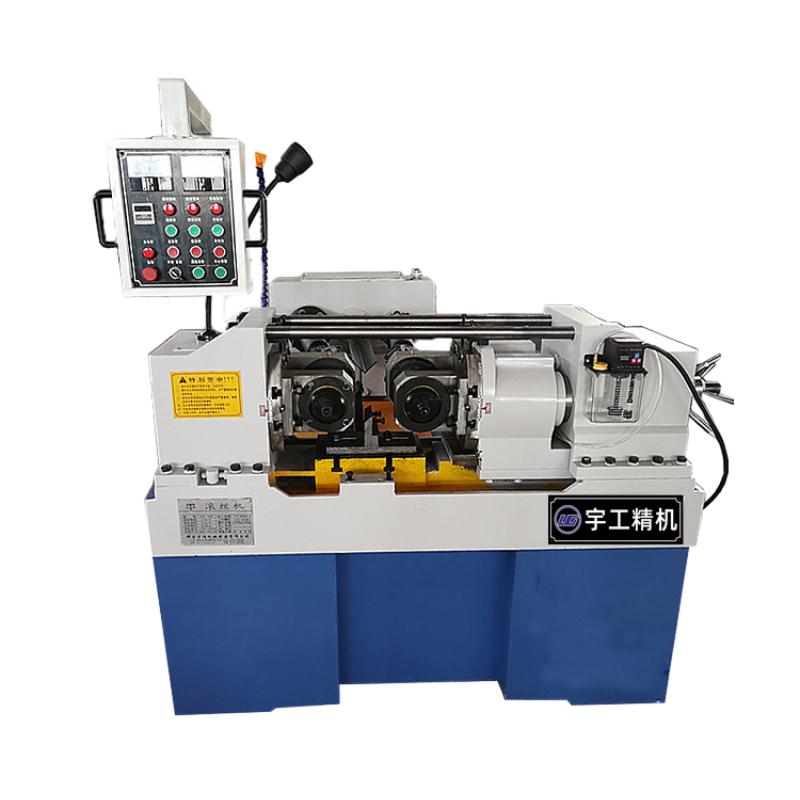
Industry Applications and Core Advantages
Reed thread rollers are indispensable across a broad spectrum of industries, including petrochemical, metallurgy, automotive, aerospace, construction, and water supply/drainage systems. In the petrochemical sector, they produce high-integrity fasteners for pipelines and valves, critical for preventing leaks and ensuring safety. For the construction industry, particularly in rebar processing, the ability of an automatic high speed bolt rebar thread rolling machine to form strong, consistent threads on rebar enhances structural integrity and speeds up assembly. Their inherent cold-forming process offers significant advantages over traditional cutting methods, such as increased thread strength, improved surface finish, and enhanced fatigue resistance due to work hardening and the unbroken grain flow within the material.
Technical Deep Dive: Parameters and Performance of Reed Thread Rollers
Understanding the key technical parameters of a reed thread roller is crucial for selecting the right tool for specific applications. These parameters directly influence the quality, efficiency, and cost-effectiveness of the threading process. The design of the thread rolling dies — whether they are flat dies (reciprocating) or cylindrical dies (rotary) — determines the operational mechanics and the types of threads that can be produced. For example, flat dies are commonly used in bolt and screw manufacturing for high-volume production of specific thread forms, while cylindrical dies offer greater versatility for different thread pitches and diameters, often used in machines like the scaffolding pipe thread rolling machine.
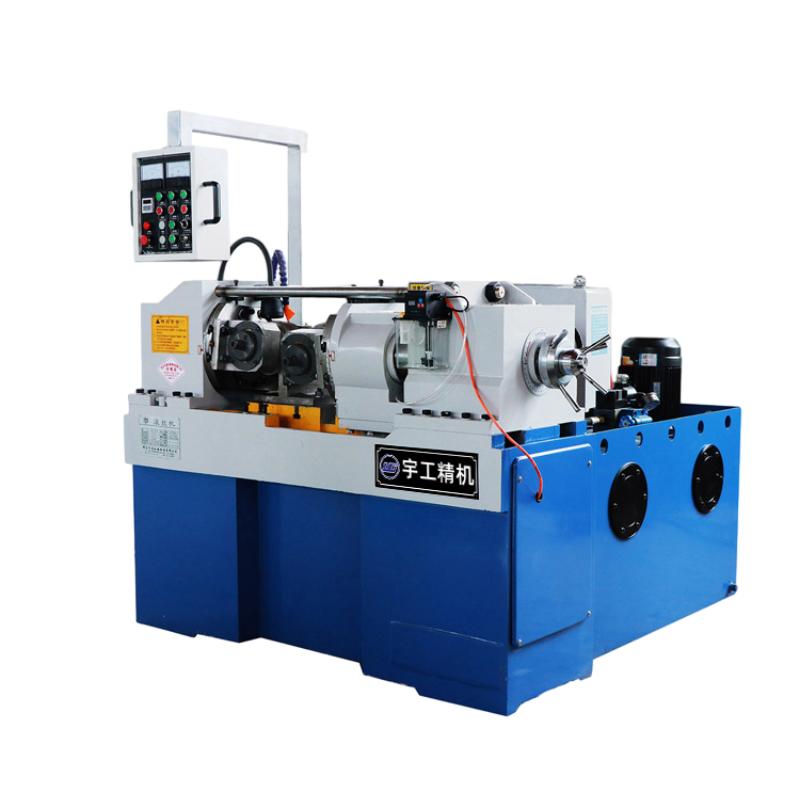
The following table outlines typical parameters for reed thread rollers used in high-speed bolt and rebar threading applications. These values can vary based on the specific machine model and intended application, but they provide a solid reference point for evaluating performance capabilities.
Typical Reed Thread Roller Specifications
| Parameter | Description | Typical Range/Value |
|---|---|---|
| Material Hardness | Rockwell Hardness (HRC) of the dies | 60-65 HRC |
| Thread Diameter Range | Range of external thread diameters the roller can produce | 6mm - 75mm (0.24" - 3") |
| Thread Pitch Range | Range of thread pitches (mm or TPI) | 1.0mm - 6.0mm (0.04" - 0.24") |
| Roller Diameter | Outer diameter of the thread rolling dies | 100mm - 250mm (4" - 10") |
| Roller Width/Length | Working surface dimension of the dies | 50mm - 200mm (2" - 8") |
| Production Speed (Parts/Min) | Typical output rate of a compatible screw rolling machine | Up to 150 parts/min (depending on part size) |
| Surface Finish | Roughness average (Ra) of the formed thread | 0.8 – 1.6 μm |
These specifications highlight the robust capabilities required for efficient thread production. The ability of a screw rolling machine equipped with high-quality dies to achieve high production speeds while maintaining tight tolerances is a significant factor in overall manufacturing productivity and cost-efficiency. This precision is vital for applications where thread integrity is paramount, such as in aerospace fasteners or high-pressure fluid systems, preventing failures and ensuring operational safety.
Unmatched Advantages of Cold Thread Rolling
The cold-forming process inherent to the screw thread rolling machine offers a multitude of technical advantages over traditional thread cutting or grinding methods. Firstly, and most significantly, cold rolling substantially increases the tensile strength and fatigue resistance of the threaded part. This is because the material's grain structure is flowed rather than cut, resulting in continuous, unbroken grain lines that follow the contours of the thread. This cold work hardening effect can increase tensile strength by up to 30%, making the threads more robust and less prone to stripping or fatigue failure under dynamic loads. This is particularly critical in high-stress applications such as those found in automotive suspensions or heavy machinery.
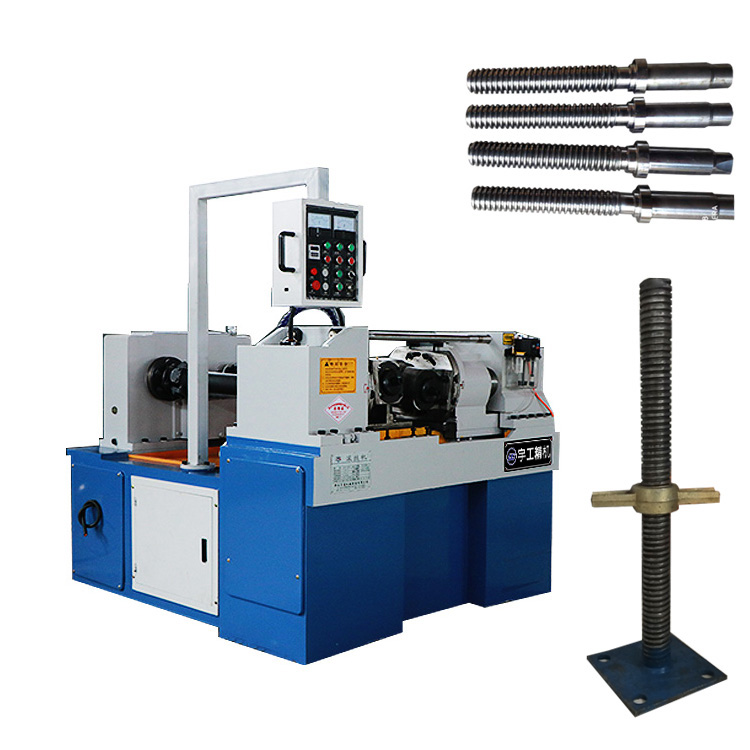
Secondly, the process results in a superior surface finish on the threads, which reduces friction during assembly and improves corrosion resistance. The burnishing action of the dies creates a smooth, compressed surface that is less susceptible to nicks, burrs, and stress concentrators that can initiate cracks. This improved surface integrity contributes to a longer service life for the threaded components, especially in harsh environments. Furthermore, cold rolling is a highly material-efficient process as it produces no chips or waste material, unlike cutting operations. This aspect not only reduces raw material costs but also simplifies waste management, contributing to a more sustainable manufacturing process. The high production speeds achievable with modern screw thread rolling machine technology also significantly lower per-part manufacturing costs, offering a substantial return on investment for high-volume producers looking to buy screw thread rolling machine.
In summary, the use of a high-quality reed thread roller within an optimized cold rolling process provides an unparalleled combination of strength, durability, efficiency, and cost-effectiveness. These benefits are not merely theoretical but are proven in countless industrial applications where precision and reliability are paramount. Companies seeking to upgrade their fastener production capabilities or enhance the quality of their threaded components will find cold thread rolling technology to be a superior solution.
Choosing the Right Partner: Vendor Comparison and Custom Solutions
When considering the investment in an Automatic High Speed Bolt Rebar Thread Rolling Machine or seeking a reliable supplier for reed thread roller dies, vendor reputation, technological prowess, and post-sales support are paramount. While several manufacturers offer thread rolling solutions, discerning between them requires a focus on specific criteria: machine robustness, die material quality, precision engineering, and the ability to provide customized solutions. Leading manufacturers often possess certifications such as ISO 9001 and CE, reflecting their commitment to international quality and safety standards. Their experience in the field, measured by service years and major client portfolios, also speaks volumes about their reliability and expertise.
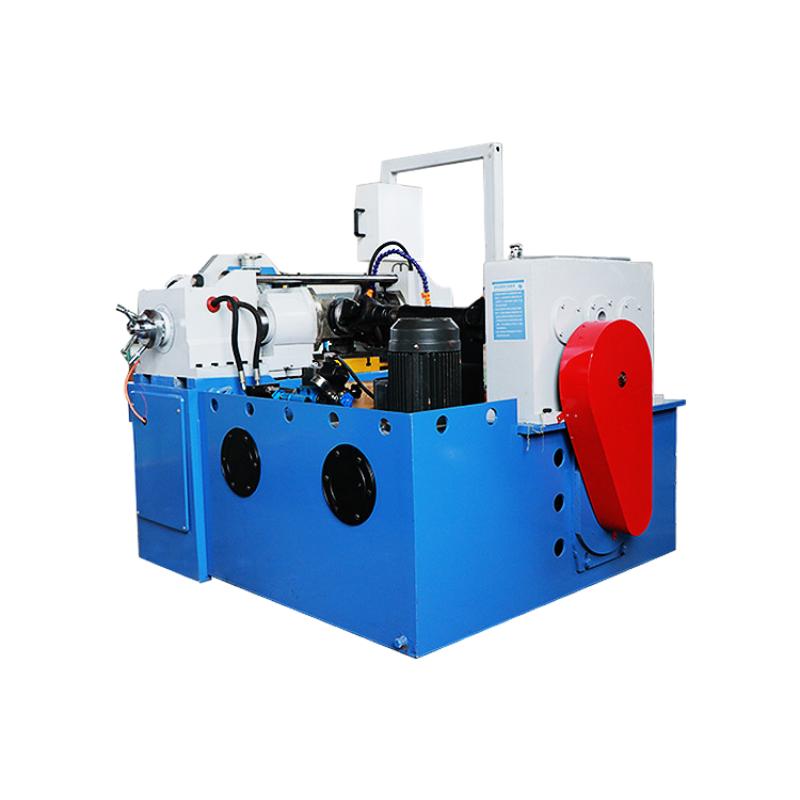
A key differentiator among suppliers is their capacity for customization. Many industrial applications demand unique thread profiles, non-standard diameters, or specialized materials for thread rolling dies. A vendor capable of offering tailor-made reed thread roller solutions, from custom pitch designs to specific material hardness for exotic alloys, provides a significant competitive advantage. This includes consulting services to optimize thread designs for specific applications, test runs with client materials, and ongoing technical support for complex projects. Our expertise in developing bespoke thread rolling solutions ensures that even the most challenging requirements are met with precision and efficiency, leveraging our decades of experience in the field.
Beyond the initial purchase of a screw thread rolling machine, long-term support is critical. This encompasses comprehensive training for operators and maintenance staff, readily available spare parts, and responsive technical assistance. The ability to quickly diagnose and resolve issues minimizes downtime and ensures continuous, high-volume production. When you buy screw thread rolling machine from a reputable vendor, you're not just acquiring equipment; you're investing in a partnership that guarantees operational excellence and sustained productivity.
Application Case Studies and Real-World Impact
Transforming Construction and Manufacturing
The impact of high-speed thread rolling technology, particularly with specialized reed thread roller dies, is best illustrated through real-world applications. Consider the large-scale infrastructure projects requiring millions of threaded rebar connections. A traditional cutting approach would be slow, prone to material waste, and yield connections susceptible to fatigue. However, with an Automatic High Speed Bolt Rebar Thread Rolling Machine, a leading construction firm was able to produce high-strength rebar threads at a rate of 100+ pieces per minute, significantly accelerating project timelines and enhancing the structural integrity of concrete elements. This efficiency, combined with the superior mechanical properties of cold-rolled threads, resulted in substantial cost savings and improved safety compliance on-site, a testament to the reliability and speed when you buy screw thread rolling machine from a trusted source.
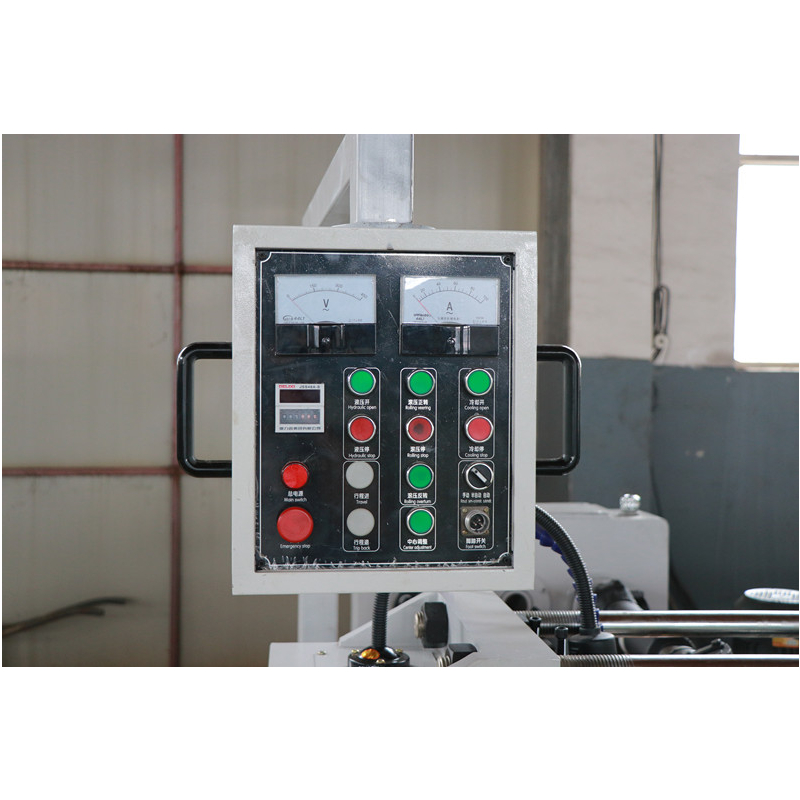
Another compelling example comes from the automotive industry, where precision and high volumes are critical. A major automotive fastener manufacturer adopted a new generation of screw rolling machine technology utilizing advanced reed thread roller designs. This upgrade enabled them to meet stringent quality requirements for engine bolts and suspension components, where thread strength and fatigue life are paramount. By switching from a cutting process to cold rolling, they observed a 25% increase in fastener fatigue life under dynamic load testing, directly contributing to enhanced vehicle safety and reliability. The significant reduction in cycle time and elimination of material waste further boosted their operational profitability and reduced their environmental footprint.
These case studies underscore the transformative potential of investing in cutting-edge thread rolling technology. Whether it's for large-diameter rebar in civil engineering or miniature fasteners in electronics, the principles of increased strength, improved surface finish, and accelerated production remain consistent. The longevity and reliability offered by expertly manufactured reed thread roller dies ensure a consistent, high-quality output, minimizing rework and maximizing throughput for demanding B2B applications.
Ensuring Trust: FAQs, Delivery, and Warranty Commitments
Frequently Asked Questions (FAQs)
-
Q: What is the typical lead time for an Automatic High Speed Bolt Rebar Thread Rolling Machine?
A: Our standard delivery for an Automatic High Speed Bolt Rebar Thread Rolling Machine is typically 4-6 weeks, depending on customization requirements and current production schedules. We strive for efficiency without compromising on the quality and rigorous testing each machine undergoes before shipment. For specific urgent requirements, please contact our sales team to discuss expedited options and feasibility.
-
Q: What kind of warranty is offered on your reed thread roller dies and machines?
A: We provide a comprehensive 12-month warranty on all our thread rolling machines from the date of installation or 18 months from shipment, whichever comes first, covering manufacturing defects. Our reed thread roller dies come with a material and workmanship guarantee for a specified period, typically 3-6 months or a certain number of parts, depending on the application and material being processed. Our commitment is to ensure your long-term satisfaction and operational continuity.
-
Q: Can your screw thread rolling machine handle various material types?
A: Yes, our machines are engineered to handle a wide range of materials, including carbon steel, alloy steel, stainless steel, aluminum, brass, and even some high-strength aerospace alloys. The key lies in selecting the appropriate reed thread roller dies with the correct material composition and surface treatment for your specific application. Our technical team can advise on the optimal die selection for your material requirements, ensuring efficient and high-quality threading.
Commitment to Customer Support
Beyond initial delivery, our dedication to customer success is unwavering. We offer extensive after-sales support, including remote technical assistance, on-site troubleshooting by experienced engineers, and a readily available inventory of spare parts for our screw rolling machine range. Our goal is to ensure maximum uptime for your operations, providing the confidence that your investment in our technology will continue to deliver performance for years to come. Our global service network is designed to provide rapid response and expert guidance, solidifying our reputation as a trusted partner in industrial threading solutions, especially for those looking to buy screw thread rolling machine.
Conclusion: Powering the Future of Precision Fastening
The journey through the intricate world of the reed thread roller and the advanced machines it powers reveals a critical component in modern manufacturing's pursuit of excellence. From the meticulous multi-stage production process of the dies themselves, emphasizing material science and precision engineering, to their indispensable role in creating high-strength, fatigue-resistant threads across diverse industries, their value is undeniable. The technical advantages of cold thread rolling—superior material properties, enhanced surface finish, and high production efficiency—position it as the optimal choice for any discerning B2B operation.
Investing in a high-quality Automatic High Speed Bolt Rebar Thread Rolling Machine or the specialized reed thread roller dies signifies a commitment to superior product quality, operational efficiency, and long-term cost savings. By partnering with manufacturers who prioritize quality, offer extensive customization, and provide robust after-sales support, businesses can confidently elevate their threading capabilities and meet the stringent demands of today’s industrial landscape. The future of precision fastening is undeniably tied to these advanced technologies, ensuring reliability and performance where it matters most.
References
- Smith, J. A. (2020). Advances in Cold Forging and Thread Rolling Technology. Journal of Manufacturing Processes, 48, 123-135.
- Davies, P. L. (2019). Mechanical Properties of Cold Rolled Threads: A Comparative Study. International Journal of Machine Tools and Manufacture, 142, 78-89.
- Gupta, S. K., & Sharma, V. (2021). Surface Integrity and Fatigue Performance of Threaded Components. Materials Science and Engineering: A, 805, 140660.
- ISO 9001:2015 Quality management systems – Requirements. (2015). International Organization for Standardization.
- ANSI/ASME B1.1-2019 Unified Inch Screw Threads (UN and UNR Thread Form). (2019). American Society of Mechanical Engineers.
